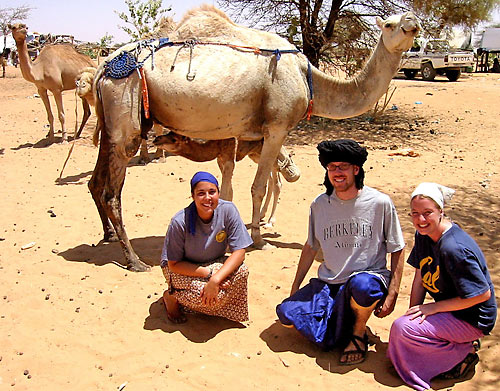The Seven Year Switch
As I was about to begin my English class one evening, a student spoke up. “Mr. Luke, this woman has something to ask you.” I had hardly noticed the lady and young girl in the corner, figuring that a new student brought her kid along. “Tell him, tell him!” she says to the girl in Hassaniya. Reluctantly, then, the girl says, in distinctly American English, “My aunt wants to know if you can teach me English so I don’t forget.”
Some believe that mefloquine, the anti-malaria drug of choice for Peace Corps, can bring about hallucinations, so I closed my eyes and tried to concentrate. Teach me English? Most English teachers here can’t construct a sentence like that. I opened my eyes. The girl was still there, with her head cocked at an angle and an expression that seemed to say “well?????” I asked her some questions, and she replied in English, to my continued amazement. “How long have you been here?” I asked her. “I dunno, I kind of forget a lot of things.” I had to be hallucinating.
Six years ago, a Moorish couple secured a visa to the United States and moved with their one-year-old daughter Fatimetou to Columbus, Ohio. How they got visas I’m not certain, but Fatimetou told me that her father used to be the President of Africa, which has got to carry some weight at the American Embassy. After a few years another daughter was born and given the name Christine. A few more years and another daughter, this one Lalla. Both of Fatimetou’s sisters are therefore American citizens. Fatimetou is not, to my knowledge.
Earlier this year, the children’s maternal grandfather became ill. The parents decided that the father would stay in Columbus (he works at a grocery store) and the mother would return to Kiffa with her daughters, to be with her ailing father.
Fast forward a few months to the present, and now you have a household in Kiffa featuring a widow, a dozen young adults and three little girls running or crawling around in varying states of American-ness.
Lalla, at around a year old, doesn’t say much. Christine knows English, but is shy, and after a couple visits she would climb on my head but not talk. Fatimetou makes up for them both.
“Why you always wearin’ that hunting hat?” she prods in a vaguely urban accent. “Why you always wearin’ crazy African shirts?” “What is wrong with you, anyways?” When she’s not riding a goat around the living room or begging a nickel off her aunt to buy candy, Fatimetou likes to tease dorky guys as much as any American girl, it seems.
I have my own questions. Are you going to school? Yes, no, sort of, I dunno. Did you get to see your grandfather when you got here? Whispered: we aren’t supposeta talk about dead people! Are you going back to Columbus? Yes, no, maybe, I dunno.
The mother speaks decent English and is generally busy with local politics, running the mandatory street-side boutique, and looking worried about, I presume, how to get back to Columbus.
“Do you have any painkillers?” she asks me one afternoon. “No,” I say, guilt meter shooting up because it’s a lie. “We brought a lot of stuff with us from America,” Fatimetou adds. “But you used it all?” I guess, watching her grandmother cough up phlegm onto her hand and fling it across the room out an open window. “No, we sold it.” Guilt meter drops back to zero.
I think about this family with mixed emotions. Living in Mauritania is difficult, but it’s not that bad for the middle class, so I wouldn’t feel terrible if these girls couldn’t return to America.
But what is in store for them here? Fatimetou and Christine will lose their English. They will be placed in atrocious public schools or perhaps slightly better private schools. They will be expected to conform to the role of a woman in Mauritania, which is changing but is nothing like life in America.
Will they be circumcised or force-fed or reduced to domestic servility? Probably not. From looking at the young black African girl who cooks and cleans and the satellite dish that brings in must-see Mexican soap operas, it seems this family is doing well for now. But that standard of living is most likely based on a few hundred dollars a month sent back from the US.
What was life like for Fatimetou in America? She remembers good things, like Wendy’s and pizza and playing in the snow. She also recalls darker details, like the convicted sex offender who lived in their neighborhood and the school shooting she witnessed one morning at her public school. She claims that she saw two older students fighting, and when she ran to tell a teacher she heard a gunshot. Looking back she saw a boy lying in a pool of blood. He died.
There’s a part of me that doesn’t believe a word Fatimetou says. She has mischief in her eyes, and she has been through a traumatic experience in the last three months, going back to a country and climate and a way of life that conjures up no memories whatsoever. But as rarely as it happens in America, kids do shoot each other and creepy men do introduce themselves to their new neighbors with police escorts. Maybe I’m just offended that she made fun of my hat.
As I sit in the family’s living room and force down a mouthful of mystery meat, at least I don’t fear being shot on the street. Living in Washington, DC, the cuisine was fantastic, but the walk home was more un-nerving. It’s one of the many tradeoffs a seven-year-old semi-American girl and I will have plenty of time to think about.


<< Home